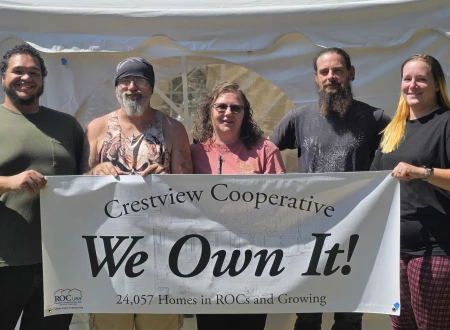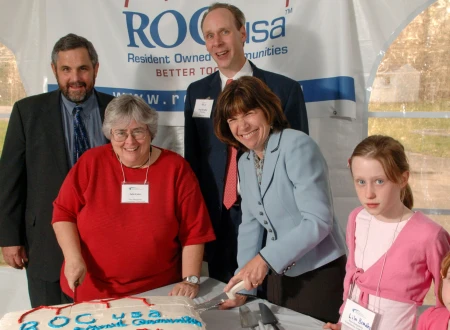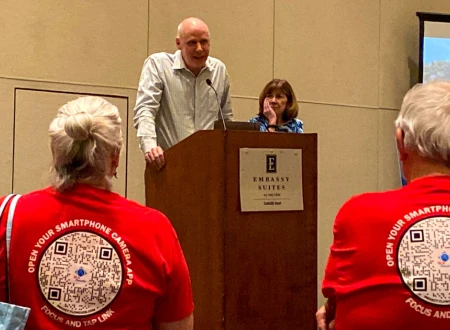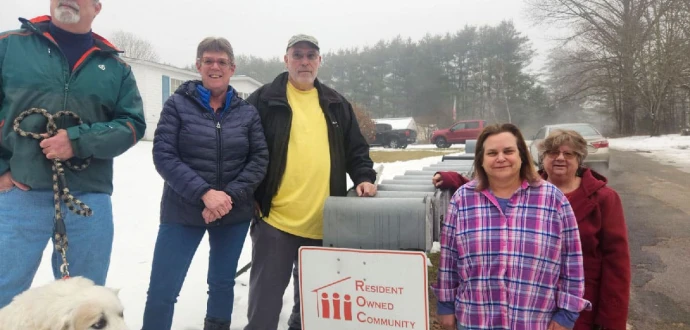
Cooperative Development Institute’s WISP program could help ROCs in six states
PLYMOUTH, N.H. – When the Board at Pine Gate Cooperative learned of a federal program that could provide enough funding to fix the community’s failing sewer infrastructure, they immediately went into action.
“I sent out a newsletter to everyone saying that we are working on a WISP grant and the first thing we needed to collect is the gross annual income. Most people hand out the survey and a self-addressed stamped envelope and leave it with their neighbors to fill out,” said Andrea Charbonneau, Board Treasurer at Pine Gate. “We didn’t do that. We went door to door, waited for them to fill out the survey and watched as they put it in the sealed envelope and left with it. We needed 90 percent participation, and it usually takes about eight months. We got the 90 percent in a month.”
Pine Gate is a 34-home community nestled under the tall pine trees in a rural part of central New Hampshire. Homeowners purchased the community in August 2022. Most of the Board still works, and in fact Charbonneau, who is retired, recently went back to teach music full-time while she covers for the teacher during her maternity leave.
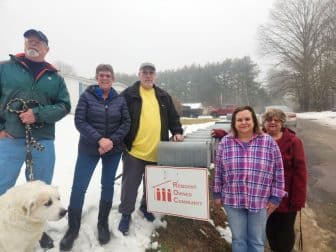
“We all have a lot going on, but we get along as a Board, and we realized what needed to be done and we all did it,” she said. “It’s hard because you don’t want to come across as nagging. But when everyone understood what was happening and how it could help our community, they seemed excited.”
Cooperative Development Institute (CDI) launched the Water Infrastructure Support Program or WISP in April 2023 to help resident- and nonprofit-owned manufactured home communities access the funding to build a safe and reliable water and wastewater infrastructure. (CDI is the ROC USA® Certified Technical Assistance Provider for the five New England states outside New Hampshire, but is administering this program in all six New England states.) It’s a four-part process that includes:
- Assessment of the potential project,
- Project development,
- Securing the funding, and
- Project implementation.
To be eligible, the manufactured home community in New England must be resident-owned or nonprofit owned, in a USDA Water and Environmental eligible area, and in a town with fewer than 10,000 people and a median household income lower than the state median.
Historically, the infrastructure in these communities is original to the development of the community and oftentimes is in a dire state of disrepair.
“The septic is failing,” said Charbonneau. “It’s old, original, and this community was built in the ‘70s. We need an overhaul of the entire septic system, and we also need new roads, a new water system and a new electrical system. But we can’t fix the roads until we get the water fixed, electrical fixed and sewage fixed. So we are looking at trying to get $2.5 million in funding.”
With help from ROC-NH, the community’s CTAP and a program of the New Hampshire Community Loan Fund, the Board began the process to secure WISP funding. There are 140 cooperatives across New England that are eligible for the funding and so far, 24 have applied, said said Jeremiah Ward, Program Director with WISP who works with Program Associate, Annik Paul. While the process is lengthy and could take more than a year for ROCs to see the funding, the first step to the process is receiving 90 percent of a community’s income surveys, a required step from the USDA.
“It’s important to have a Board that works together and is willing to do the work together,” Ward said. “Pine Gate helped neighbors secure their confidential income surveys and that step alone usually takes months but because they did it quickly and efficiently, it’s going to help them along in the process.”
For more information about WISP and to find out if your ROC is eligible for funding, click here.


